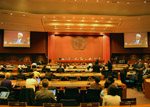<p>The second 2012 session of United Nations climate change negotiations took place in Bangkok from 30 August to 5 September. The informal session at official level formed part of preparations for the annual ministerial conference being held from 26 November to 7 December in Doha, Qatar.</p>
- climate change policy | international cooperation
- Thursday 30 August 2012, 02:00 - Thursday 6 September 2012, 01:59 (CEST)
Practical information
- When
- Thursday 30 August 2012, 02:00 - Thursday 6 September 2012, 01:59 (CEST)
- Languages
- English
Description

In Bangkok the three ad hoc working groups established under the UN Framework Convention on Climate Change (UNFCCC) and the Kyoto Protocol continued their negotiations from the Bonn conference in May.
The EU's objective was to see draft negotiation texts for Doha prepared in Bangkok. This goal was achieved only with regard to the negotiations under the Kyoto Protocol. In intensive and constructive discussions, all Parties agreed on the need to adopt a second Kyoto commitment period in Doha and identified options for resolving all outstanding issues. The negotiations resulted in an unofficial paper outlining the elements for a decision in Doha.
After the difficulty of agreeing an agenda and co-chairs in Bonn, negotiations under the Durban Platform for Enhanced Action got off to a constructive start. The Durban Platform has been established to draw up a new global climate agreement, to be adopted by 2015 and to take effect from 2020, and to identify ways to achieve more ambitious emission reductions before 2020 in order to keep global warming below 2°C.
Informal roundtables held in Bangkok produced a useful initial exchange of ideas on both parts of the Platform's mandate. Still, more work remains to be done to secure agreement in Doha on a workplan that would put the Durban Platform on track to deliver by 2015, as well as on a decision addressing greater global emission reductions pre-2020.
In the working group on long-term cooperative action, the EU was expecting discussions conducive to its closure in Doha, as agreed in Durban last year. However, the Bangkok session made little progress towards overcoming fundamental divergences between Parties on the results produced so far and potential outstanding issues that could be taken forward in other bodies after Doha.
Balanced progress across these three tracks will be needed in Doha to deliver on all the elements of the package of decisions agreed in Durban.
Read More:
EU statements in Bangkok
- Statement at workshop on developing country pledges, 2 September 2012
- All EU statements in the Ad Hoc Working Groups and in informal consultations on the Doha conference
